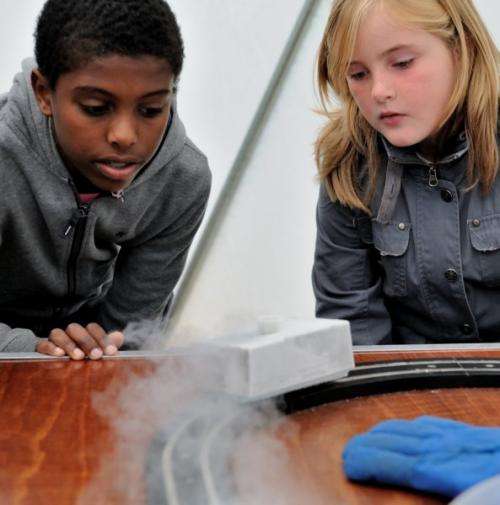Early encounters with engineering and technology are important for children

Teaching science and technology in primary education is a must if we are to avoid massive shortages of skilled technical staff in the future. It will also equip young people with the skills needed for the 21st century. For quite some time now, Prof. Juliette Walma van der Molen of the University of Twente has been advocating a new approach to education. This is based on research showing that children's natural interest in research and design (and the related professions) simply fades away if they do not encounter these activities in a positive context during their time at primary school.
Walma van der Molen points out that "Young children are inquisitive and love exploring their world. At the end of their primary school career they show a pronounced interest in new technologies. Take environmental issues or climate control, for example. Sadly, these topics seldom feature in primary education". "While children understand the challenges facing society, they often fail to appreciate that science and technology (S&T) can provide solutions to these issues, and that they themselves can play a part in this process. Even before they leave primary school, some pupils have already turned their back on certain job profiles. Children aged ten to twelve see science as difficult, boring and something for "nerds". They also view jobs in engineering as "dirty" and economically unappealing. Throughout their school career, children must encounter research and development in an accessible and creative way. It is important for them to discover that they enjoy it and that they have a talent for it. In this way, when they are older, they will be able to happily pursue science or engineering as career options rather than rejecting them out of hand.
Talent
"In our research section we believe that every single child has potential talents. Sadly, however, an excessive focus on literacy and numeracy means that we fail to notice the creative and innovative talents possessed by many children. This applies just as much to those who receive a recommendation for preparatory secondary vocational education as to high-achievers. As I point out in my inaugural lecture, a handful of compulsory lessons in S&T just won't cut it. It is important that projects should involve open-ended assignments and that they should be a spur to higher-order thinking. If they are to be truly effective, S&T projects must not slavishly adhere to a fixed lesson format. Instead they should enable pupils to examine issues from all sides, with a critical and creative eye. They should help children to formulate and shape their own thoughts, while allowing them to put forward novel solutions of their own. There should be opportunities for them to reflect, and to modify their views. Pupils should be made to understand that there is usually more than one correct answer or one fixed solution. Now more than ever, we need an approach that will help us develop our knowledge and improve existing issues."
Provided by University of Twente

















